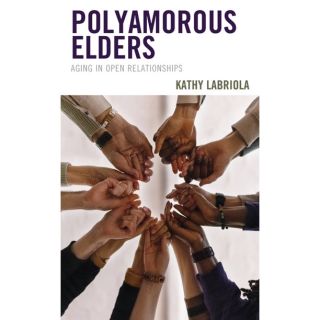Polyamory
Shared Carework in Polyamorous Families
Families can provide significant care throughout the lifecourse.
Posted February 2, 2023 Reviewed by Kaja Perina
Key points
- Families provide key points of care across people's lives.
- Polyamorous families share care responsibilities, which helps the whole family.
- Shared childcare makes parents' and children's lives easier.
- Sharing care for ill, disabled, elderly, or dying people leads to better care and higher quality of life.
Families are the most common point of care for people in contemporary US society. From making food and doing laundry to taking people to doctor’s appointments and making enough money to pay for a place to live, families often provide each other with the types of daily support that everyone needs. This kind of care is especially important for people who can’t care for themselves, either because they are children, ill, disabled, old, dying, or dealing with the outcomes of someone else’s death. By spreading the work around among multiple people, polyamorous families can help each other cope with the care needs of their families.
Childcare
Children need a lot of care for a long time. While the type and focus on the care changes over time – from feeding infants to supervising toddlers and teaching teens to drive or manage their own time and money – the need for young humans to get attention and direction from older humans lasts for many years. If it is just one or two people giving all of the attention and direction it can quickly become exhausting.
In my Longitudinal Polyamorous Family Study (LPFS: 1996 – present) I have found that parents with multiple close partners fare better at many different life stages than parents with less support. That is not to say that the only way to get support is through having multiple romantic partners and metamours (partners’ partners), but that the assistance these families offer each other can be invaluable in making life easier for polyamorous folks.

For example, having more adults around makes it a lot easier to earn enough money for the family to meet its basic needs and perhaps even have some extra funds. With incredibly high costs for housing, food, and transportation, many families struggle to care for themselves financially. Spreading the paid work around leaves more time for everyone to do something else besides work multiple jobs and more attention for kids, partners, and self-care.
Similarly, a family in the LPFS had a baby with severe infant colic, a condition in which gas builds up in the baby’s stomach and they feel extremely uncomfortable. In significant pain, the infant would cry unconsolably all night, every night, for months at a time.
Because there were three adults in the parenting rotation, each adult got two nights of solid sleep before they had to take on the wailing infant again. One of the parents remarked to me that they are not sure everyone would have survived that baby’s infancy without being able to spread the night work around. Exhausted parents are less functional, more irritable, and unhappier than well-rested parents, so their ability to sleep well for two-thirds of the time made a significant difference in the family wellbeing and the care they were able to offer their elder child and each other.
Illness and Disabilities
At some point in our lives, most people will become ill or disabled. When that happens, we need help from others in our lives, from bringing us soup to giving us rides. People in polyamorous families often have a built in system of folks who can help to take care of them, not only their multiple partners, but their metamours and other members of their polycule. Sharing domestic work when someone in the family is ill or disabled can make a huge difference in comfortable living and is the tip of the proverbial iceberg when it comes to what it takes to care for a whole family including ill or disabled members.
Food and housing are crucial for happy living, and both require money. Just like families with small children who require care, it is incredibly helpful in families with ill or disabled members to have more than one person able to earn money. Spreading the earning capacity among several people means that the family can remain housed and fed (as well as use electricity, stay warm or cool, pay medical costs, use transportation, etc.) even if a member is unable to work for pay.
Being ill or disabled can be lonely, both for the person who is unable to go out and enjoy all the world has to offer and for their significant others who miss their company when they are out and about. Having multiple folks around to provide company at home and/or out adventuring means that everyone can have more company and support. This is great not just for people with illnesses or disabilities, but also for folks with a social mismatch. If one person is an introvert who would rather not go to the crowded event, then they can stay home and have some quiet time with space to themselves while their other beloved(s) go out and enjoy the excitement of the loud crowd.
Aging
Aging is likely to bring illness and disability, so all of the advantages noted above can translate for aging folks as well. Furthermore, as people age they are more likely to experience death among their friends, families, and partners. Having a wider social network of supportive folks can make the illnesses, disabilities, and deaths that come with aging a lot easier to manage. While establishing a polycule is not the only way to achieve this supportive network, it is a popular one for people who like having multiple partners.
When biolegal (linked through shared DNA or legal arrangements like marriage or adoption) family members die, remaining loved ones are often required to deal with the after-affects of their death. One of the most onerous tasks associated with the death of a loved one is cleaning out their living quarters and disposing of their stuff. This can be especially difficult for aged children whose elderly parents lived in a house for many years and left the accumulated possessions of a lifetime. Having help at this difficult time can be incredibly valuable, and it turns out that members of a polycule can be truly excellent at coming to each others’ aide when dealing with the aftermath of death.

In her book Polyamorous Elders: Aging in Open Relationships, Kathy Labriola reports on the various ways in which polyamorous elders have helped each other through the death and dying process. Labriola recounts how obvious this became to her respondents when the COVID pandemic hit and people around the world were dealing with their loved ones’ death and dying.
Labriola states “Many poly elders have been rejected by and estranged from their biological families for decades, in some cases including their adult children. So, they often do not have much support from their bio-families in their elder years. However, they often have much more support from their partners, metamours, and often their ex-lovers. This translates into everything from housework and cooking to nursing care to financial support.”
Because the vast majority of carework falls to women in US (and many other) societies, polyamorous families can be especially advantageous for women with children, who have disabilities themselves or family members with disabilities, and old or dying women or women with old or dying family members. Spreading the carework around can mean better mental and physical health for everyone, and greater happiness for the carers and the cared for.
References
Labriola, Kathy. 2022. Polyamorous Elders: Aging in Open Relationships. Rowman & Littlefield.




